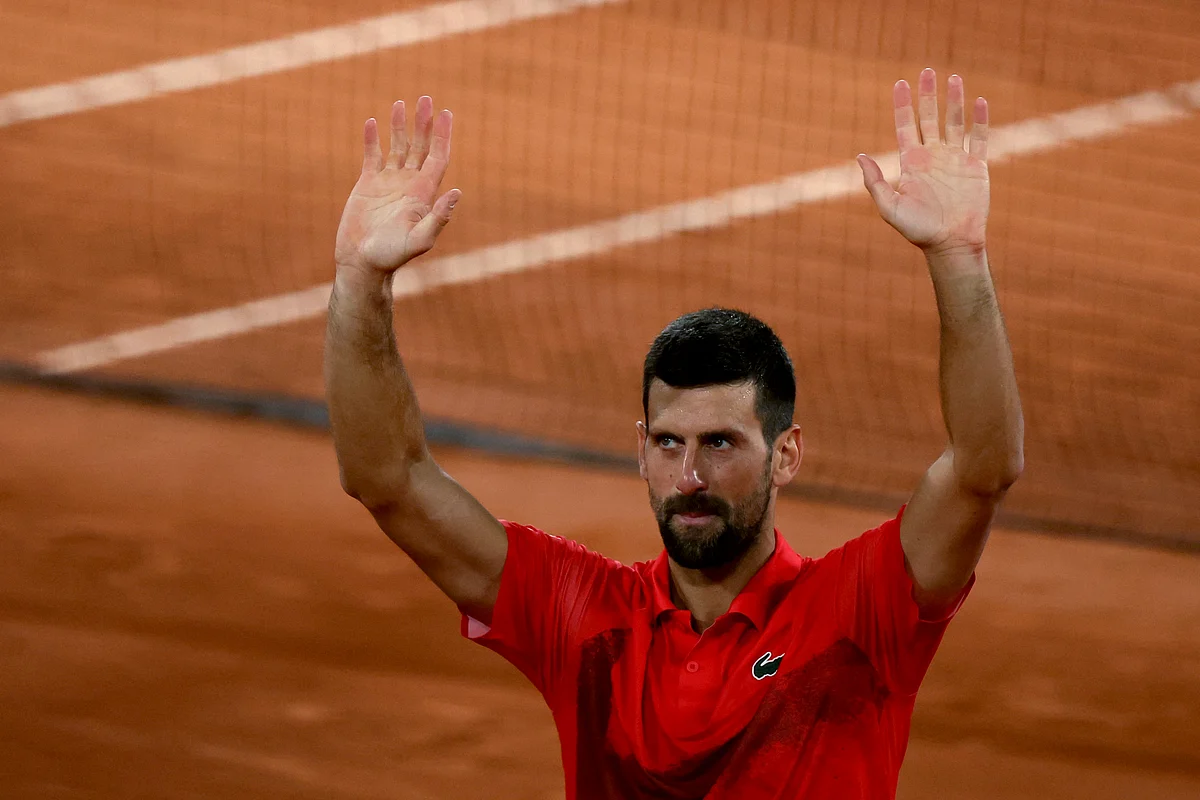Hand on clay, heart in Paris: Novak Djokovic’s emotional Roland Garros exit
Serb fought hard in semis, but his final gesture suggests this may be his last French Open

Novak Djokovic stood still on the red clay, his gaze sweeping across Court Philippe Chatrier. He placed his hand on the surface, a quiet gesture of farewell — or perhaps just reflection. As the crowd rose in applause, the 38-year-old Serb paused longer than usual, soaking in the moment. It felt different. And maybe, just maybe, it was.
The three-time French Open champion had just suffered a straight-set defeat to world No 1 Jannik Sinner in the semi-finals — 6-4, 7-5, 7-6 (7/3). The match marked a passing of the torch in more ways than one: Djokovic’s precision and experience versus the Italian’s blistering movement and youthful fire. Yet what lingered after the final point wasn’t the loss, but what followed.
“This could have been the last match ever I played here, so I don't know,” Djokovic admitted later. “That's why I was a bit more emotional even in the end.”
That hint of finality hit differently. For the better part of two decades, Djokovic has been one of the sport’s immovable forces — chasing and then surpassing his Big Three rivals, rewriting the Grand Slam record books, reinventing what longevity in tennis looks like. But in Paris, the body language told a quieter story. One of weariness, of time catching up, and of perhaps beginning to let go.
A body battered, a mind undeterred
Djokovic arrived at Roland Garros this year under a cloud of uncertainty. A minor meniscus tear had required surgery just weeks before the tournament. Earlier in the season, he had retired mid-match at the Australian Open, citing a muscle issue. Questions about his physical state lingered throughout the clay season. But Djokovic ended his latest rut by winning his 100th career title at the Geneva Open before arriving at Roland-Garros.
But in trademark fashion, he refused to go quietly. In the quarter-finals, he pulled off a stirring win against Alexander Zverev — the very opponent who had forced his retirement in Melbourne. That match served as both revenge and reassurance. Even hobbled, Djokovic’s fight was intact.
Still, against Sinner — a player 15 years his junior — the gap looked wider than ever. Djokovic struggled to find his usual rhythm, his movement noticeably hampered. He did break Sinner’s serve for the first time since their US Open clash last year, but the energy required to stay level with the Italian over three sets was immense.
And as the final tiebreak slipped away, so too did the chance of a record-extending 25th Grand Slam title.
The echo of memories
Few venues have brought Djokovic the blend of frustration and fulfilment that Roland Garros has. The red clay was long considered his Achilles’ heel, especially with Rafael Nadal standing in his way. But over time, Djokovic conquered it — lifting the Coupe des Mousquetaires in 2016, 2021 and 2023, each win a study in resilience.
Then, last year, came a crowning moment: Olympic gold on this very court — the missing piece in an otherwise glittering resume.
So, when Djokovic lingered after the loss, placing his hand on the court, it wasn’t just a thank-you. It was communion with a surface that had both tested and validated him.
“I tried to show my gratitude to the crowd, because they were terrific,” he said. “I don’t think I have ever received this much support in this stadium in my career... very honoured to experience that.”
It was a telling shift. Djokovic has often had a prickly relationship with the Parisian crowd, occasionally playing the role of pantomime villain. But not this time. On Friday, he was the ageing hero, still swinging, still believing — and deeply appreciated.
Still chasing history
Despite the emotions, Djokovic isn’t ready to call time just yet.
He remains tied with Margaret Court on 24 Grand Slam titles — a record he’s long targeted for sole ownership. Wimbledon, beginning June 30, now looms large.
“Wimbledon and US Open, yes, they are in plans,” he confirmed. “I want to play Wimbledon. I want to play US Open. Those two, for sure. For the rest, I’m not so sure.”
It’s a pragmatic calendar — one built around opportunity and legacy, not volume. Djokovic knows his body can no longer grind through the year-round circuit. But two more shots at glory? That’s a game still worth playing.
Sinner, the man who beat him, echoed the sentiment of many: “We hope it’s not the case [that this was his last match here], because I feel like tennis needs him in a way.”
Djokovic himself put it more cryptically: “I don’t know really what tomorrow brings at this point in my career. I’m going to keep on keeping on.”
The curtain flutters — not falls
Whether this was Novak Djokovic’s final French Open appearance remains to be seen. But if it was, he leaves not with fireworks but with grace — touching the clay, waving to the crowd, and exiting with history still within reach.
And if there’s one thing sport has taught us about Novak Djokovic, it’s this: don’t count him out until the curtain truly falls.
Sign up for the Daily Briefing
Get the latest news and updates straight to your inbox
Network Links
GN StoreDownload our app
© Al Nisr Publishing LLC 2026. All rights reserved.
